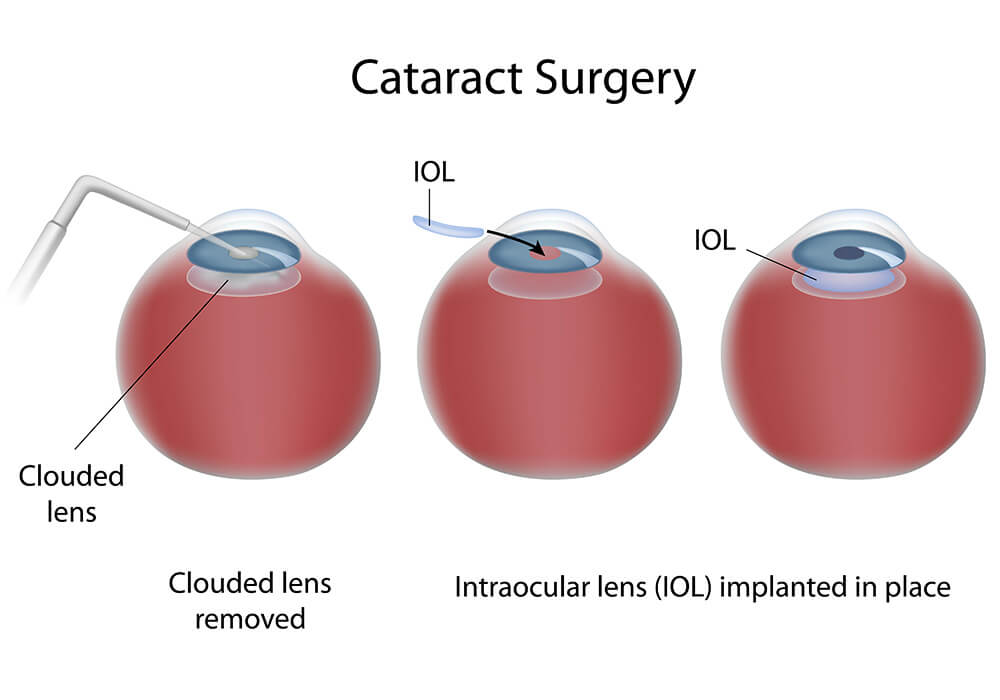 The Milwaukee cataract specialists at Eye Physicians Associates are trained in the most advanced procedures for cataract removal. Our team of highly skilled surgeons are also educated in intraocular lens technology to ensure you receive the best lens implant for your lifestyle.
The Milwaukee cataract specialists at Eye Physicians Associates are trained in the most advanced procedures for cataract removal. Our team of highly skilled surgeons are also educated in intraocular lens technology to ensure you receive the best lens implant for your lifestyle.
What is a Cataract?
A cataract is a clouding in the lens of the eye. Most cataracts are age-related — they develop when protein clumps together inside the lens. Cataracts can occur in one or both eyes, and they typically develop in adults over age 40. Cataracts are a very common eye condition that affects more than half of all Americans by age 80.
Are There Different Types of Cataracts?
There are several different types of cataracts:
- Age-related cataracts are the most common type.
- Secondary cataracts can develop after an eye surgery, from diseases, or steroid use.
- Traumatic cataracts can develop years after an injury to the eye.
- Congenital cataracts can occur in babies or small children.
- Radiation cataracts occur after exposure to certain types of radiation.
What are the Symptoms of a Cataract?
- Blurry vision
- Colors appear faded
- Glare from headlights or sunlight seems intensely bright; halos around lights
- Poor night vision
- Double vision
- Frequent prescription changes for eyeglasses or contacts

What Should I Do if I Have a Cataract?
Many people have early stage cataracts for years before considering cataract surgery.
Here are some suggestions for handling the early stage of this condition:
- Have an annual dilated eye examination every year if over age 65, and every two years if under 65.
- Wear good quality sunglasses to protect the eyes from damaging UV rays.
- If you are having trouble reading, use brighter lights and a magnifier.
- Make sure you have an up-to-date prescription for your glasses or contacts.
- Quit smoking
- If you have diabetes, keep your A1C in a healthy range
Cataract Treatment Options
Cataracts cannot be treated with medication. Surgery is the only option for removing cataracts from the eye. Most ophthalmologists recommend cataract surgery when patients feel that a cataract is interfering with their job, driving, or quality of life.
Does Insurance Pay for Cataract Surgery?
Medicare and most insurances do pay for cataract surgery when it is considered medically necessary. They may require certain vision measurements that show the need for surgery. Contact your insurance company to determine what co-pays and deductibles you may be responsible for.
Most insurances, including Medicare, will pay for a standard monofocal intraocular lens. However, you will be responsible for the cost of the lens if you choose a “premium” intraocular lens. You should discuss the cost and benefit of these lenses with your eye surgeon.
Types of Intraocular Lenses (IOLs)
- Monofocal IOLs are the most common type of lenses used in cataract surgery. They can be set for distance, medium, or up-close vision. Most people choose distance vision and use reading glasses when needed.
- Multifocal IOLs contain zones that can be set for both distance and near vision. The brain learns to select for the focus it needs.
- Toric IOLs are used to correct the refractive error caused by astigmatism.
What Happens During Cataract Surgery?
When you arrive at the eye surgery center, the area around your eyes will be washed and cleaned. Drops will be inserted to dilate your pupils. Anesthetic eye drops are used to numb the eye, and you should feel no pain. Most patients are awake during the procedure. You may be given medication to help you relax.

Your eye surgeon will enter the eye through tiny incisions made with a laser or blade near the edge of the cornea. Your doctor will then remove the clouded natural lens from your eye and replace it with an artificial one, called an intraocular lens (IOL). Sometimes an ultrasound is used to break up the cloudy lens and remove it from the eye with suction. Usually, no stitches are required, and the tiny incisions close by themselves.
What to Expect After Cataract Surgery
Most patients recover quickly from cataract surgery and can usually resume normal activities such as exercise or driving within a week.
Your doctor will give you post-operative instructions:
- At first, you’ll need to insert eye drops several times a day, and then less frequently for about a month. It is very important to follow your doctor’s instructions carefully.
- Keep soap and water out of your eye.
- Do not rub the eye.
- Protect the eye while sleeping and during physical activity.
- If you have cataracts in both eyes, your surgeon will probably recommend surgery on the second eye in about 4 weeks.
- You may need new eyeglasses after both of your eyes stabilize.
What are the Risks of Cataract Surgery?
Cataract surgery is one of the most common surgeries performed in the United States. Although it is a delicate surgery, it is very safe and effective.
A small percentage of patients do develop complications:
- Eye infection
- Bleeding in the eye
- Ongoing swelling of the front of the eye or inside of the eye
- Swelling of the retina (the nerve layer at the back of your eye)
- Detached retina (when the retina lifts up from the back of the eye)
- Damage to other parts of your eye
- Pain that is not relieved by over-the-counter medicine
- Vision loss
- The IOL implant may move out of position
- Posterior capsular opacification; or blurriness months or years after surgery
Cataract Surgery, Milwaukee, WI
Looking for a board-certified cataract surgeon in Milwaukee? Contact Eye Physicians Associates, S.C. to discuss your options for cataract removal. Our compassionate team of eye care experts are happy to answer your questions and determine which IOL is right for you.
